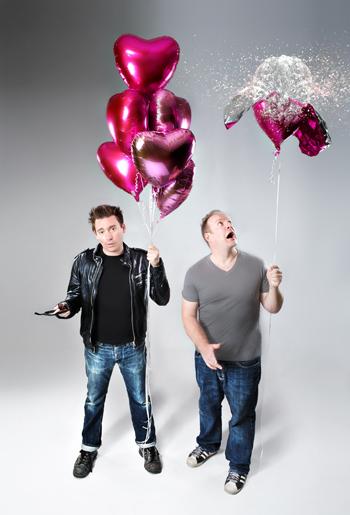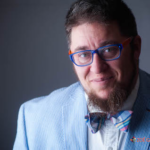When Chris Craddock name-checks the book The Ethical Slut (a book about polyamory, written by dykes) in the first five minutes of our conversation, I have to ask: Dude. How does a straight guy from the Prairies end up reading The Ethical Slut?
Craddock’s friendly face creases with a mischievous smile, and then – off the record – he tells me a charmingly salacious story. He lets me turn the tape back on in time for him to say, “I’m not that straight. I’d say I’m a half-assed bisexual who ended up married to a woman, but that’s…” He trails off, then picks up with, “I’m queer, really, in that sense. It’s a good word for things you can’t categorize neatly. Lots of room along the edges. Certainly, I’m queer in how I am, how I live.”
I introduce him to the word “heteroflexible,” which he repeats, grooving slightly in his chair. He and his Fringe co-creator, Ron Pederson (of MADtv fame), agree that they like it.
Pederson picks up this queer thought, adding, “I mean, we’re guys in theatre. There’s a lot of great –”
Craddock interrupts, “We were basically raised by –“
And Pederson finishes: “–gay wolves.”
(Interviewing two longtime friends who also work together in improvisational theatre is a trip, if you’ve never had the opportunity. Every answer comes with a riff.)
Once we’ve handled the sluts, the gay wolves and the ordering of lunch, I’m still curious – Craddock is a gender-normative white guy from Edmonton, in a straight relationship, living a life of privilege. He’s got a shelf full of theatre and writing awards: four Sterlings, two Doras, the Centennial medal, an Alberta Book Award, among others. And yet here he is, still, writing queer-themed work – good, tender, thoughtful queer-themed work, presented without any “Look at me, aren’t I an awesome ally? Right?” posturing. So what gives?
Craddock explains, serious for a minute (it passes quickly). He’s from a religious, evangelical family. Their focus on gays being bad, ironically, pushed him further away from religion and toward the gay – specifically, the aforementioned gay wolves of the theatre. After early work with Brad Fraser, and a trilogy of trans-themed plays co-written with Darrin Hagen, Craddock was clear that the queers of all stripes he’d met and worked with were great, talented folks. The disconnect began to rankle.
It got worse, he explained, in the early 2000s, when gay marriage debates raged across Canada. He vividly recounted a gaybashing on the steps of the Legislature after one of then-premier Ralph Klein’s tirades about having “used all the weapons at our disposal” in the “war against this.” With an eloquent go-to-it gesture and an elongated “So…” he made clear the point: some Albertans heard it as an invitation to use their own weapons.
From all of this, great gay work was born. Not just gay-specific themes, either, but all manner of subversively queer and feminist ideas creep into the text of his TYA (Theatre for Young Adult) plays, of which two volumes are in print. As you might expect, writing well along queer themes brought Craddock even deeper into the confidence of his LGBT-identified colleagues, deepening his queer fluency simultaneous to his (heterosexual) courtship and marriage.
And in his queer-enculturated position, he moves (and writes) freely. Craddock says he’s never had any difficulty writing or playing gay, and when asked how he feels about fans assuming he’s a ‘mo himself, he grins and says, “Fucking delighted. I mean, especially if they’re cute.”
Craddock and Pederson’s Fringe contribution in 2011, called Love Octagon, is an entirely improvised performance about love, sex and heartbreak. The show opens with a quick-and-dirty interview of audience members about recent heartbreaks and hookups. The names and themes generated as Craddock and Pederson coax details out of the audience members fill in the show, which tells the story of four couples (and all the secret sex they’re having with other members of the other couples). The show finds great humour in the broken relationships of the audience and represents them onstage in such fluid and convoluted ways that at times, even the actors might lose track of who they are, or who’s about to kiss.
The two men promise, when I ask, that they can and will fearlessly play any and all characters, regardless of sexual orientation. They volunteer the information that just an hour before our interview, during a rehearsal, they’d been lesbians. When I ask if that means there will definitely be queer characters in every show, Craddock says, “Absolutely.” At the same moment Pederson says, “Possibly.” There’s one beat, and then Craddock says, “Possibly.” At the same moment, Pederson announces, “Absolutely.” They dissolve into mock bickering, Craddock scolding Pederson in a mock-whisper, Peterson retorting, “Listen, Mary…”
Listening to them carry on like a pair of elder queens who no longer like anyone but each other, it seems safe to assume that the gay wolves who raised them must be very proud.
Love Octagon
part of Toronto Fringe Festival
Theatre Passe Muraille, 16 Ryerson Ave
Thurs, July 7, 8:15pm
Fri, July 8, 5:15pm
Sun, July 10, noon
Mon, July 11, 10:30pm
Tues, July 12, 6:15pm
Fri, July 15, 2:15pm
Sat, July 16, 10:30pm


 Why you can trust Xtra
Why you can trust Xtra


